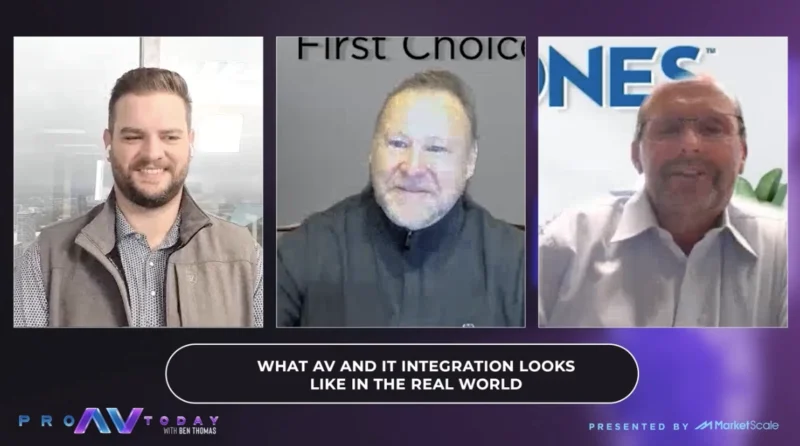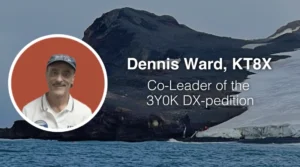Evan Bentley of Marketscale recently sat down with Harry Shaub, the Head of Audio for Elite Multimedia, to discuss acoustics and innovations in audio technology. Here are some of the highlights of the Q & A session.
Don’t have time to read, listen to the full podcast below.
Evan: So, Harry, how did you break into this field?
Harry: I played music all through middle school and high school, and afterward, attended the University of Tennessee. But when I realized I wasn’t learning to my potential, I transferred to Middle Tennessee State and signed up for the Recording Industry program there. Although I didn’t know if I could make it as a musician, I did know that I needed to be around music. While my audio career actually originated in the studio, it didn’t take long for me to realize that I didn’t care for that area of the sound business—doing the same vocal takes over and over again, etc. So, when a band I had worked with in the studio asked me to be their tour manager, I jumped on board. About three months into our relationship, they remembered I could do audio, and I’ve been doing live sound ever since. Then, in 2012, I got married, and even though I wanted to stay in the industry, I decided it was time to get off the road as I wanted a real family life. So, when Elite Multimedia called looking for a Head of Audio, I said yes, and I’ve been with them for three years now.
Evan: Let’s talk about some of the jobs you’ve done on the road and with Elite. What are some of the challenges? What do you need to do when you walk into a venue?
Harry: Everything starts with the first phone call—that’s when I determine the client’s specific needs. For music events, audio reinforcement is commonly the requirement, meaning to make things louder. But the goals with corporate venues are obviously very different. From the initial call, I decide what speakers to send, and so on from there. Then I do a site survey which entails going to the venue and doing a walk through to figure out what is needed and where. The biggest challenge in live audio is having enough sound in the right place—in the wrong place, sound can be very ugly. And some rooms are harder than others with many factors going into controlling live sound.
Evan: It sounds like you really need to do your homework.
Harry: Absolutely.
Evan: So, what is the most challenging venue?
Harry: Cruise ships with moving sound are tough. Cruise ships are designed to do one thing, so we have to get creative. For example, one time I had to put speakers over a hot tub. Their rooms are not designed for our kind of audio, so we have to be diligent in how we aim the speakers and present sound, and so on.
Evan: What is different about an outdoor festival vs. an indoor arena or small venue?
Harry: Well, you have to deal with building acoustics for indoor venues. When you are in a square or enclosed space, you have what’s called the resonant frequency of the room. Basically, that frequency just builds and builds. You need to find that frequency and control it to maximize sound quality. I used to do Christian venues with concrete walls and wood or concrete floors—acoustics and bouncing were a huge challenge. Outside, however, nothing bounces, so the goal is to have enough horsepower to throw sound as far as the audience is gathered.
Evan: What is feedback of sound? Can it be controlled?
Harry: Engineers get the blame for off-key singers on a regular basis—and sometimes it is our fault. There could be feedback in their ear which can throw them off, but this can be eliminated by keeping the singer behind the speakers or out of the speaker pattern. And often, feedback comes from monitor wedges that need to point directly at the singer/speaker. In addition, each singer wants a different level of sound, so we have to work with that as well.
Evan: What are some innovations in the field?
Harry: From an audience perspective, other than the really “out-there” stuff that happened in the 70s with quadrophonic concerts, etc., technology hasn’t really changed. Its louder, but otherwise, not too different. Behind the scenes, though, everything has changed. There’s no more analog—it’s all digital. We can now run an entire concert off one console, and we’re no longer hanging masses of lines—it takes just one line now (or 2 lines for stereo) to run an entire arena. And because the transmission is now digital, we can run a line from the mic to the amp, creating extremely pristine audio. In addition, new cleaner speaker technology is making our job as engineers even more difficult because we cannot blame poor audio on bad speakers anymore—we have to blame ourselves for bad sound.
Evan: It sounds like an exciting time to be in your industry. Unfortunately, due to time constraints, were unable to cover all aspects of the audio industry. However, I am definitely appreciative that you were willing to discuss your career with me and touch on some of the audio challenges you have experienced. Thank you for your time.
If you want to learn more about A/V hot topics, go to marketscale.com, click on the A/V Industry page to dive into a litany of A/V related podcasts. Or visit elitemultimedia.com.
Read more at elitemultimedia.com









